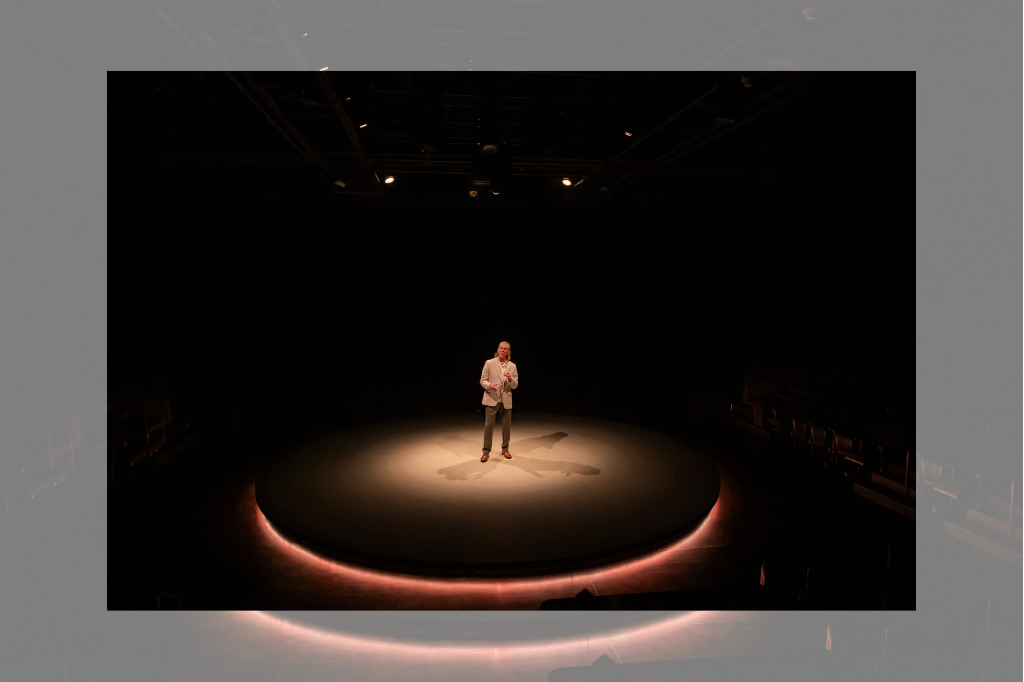REVIEW: Feast at Prairie Theatre Exchange captures the 21st century’s tragic sprawl (Winnipeg)
The plays of Guillermo Verdecchia take pleasure in flouting theatrical convention. His Governor General’s Award-winning Fronteras Americanas uses meta-theatrical narration to frame its transgressions as dangerous: “What kind of a play is this anyway? No plot, no central character. No fourth wall. That is shoddy construction. You’re totally unprotected.” And The Noam Chomsky Lectures, co-written with Daniel Brooks, acknowledges its experimental structure with a hint of guilt: “Daniel and I recognize that this show lacks… narrative.”
Feast — Verdecchia’s latest, playing in its world premiere production at Winnipeg’s Prairie Theatre Exchange (PTE) — has a narrative. A zany one, at that: it includes cross-continental treks, firearms, deception, and a few plot twists. But it’s a testament to the play’s immense maturity that these action-packed happenings feel secondary to the piece’s emotional core. As PTE artistic director Thomas Morgan Jones’ boldly abstract production unfolds (in the company’s beautiful mainstage theatre, a 323-seat thrust), it becomes clear that Verdecchia has turned to narrative only for the sake of testing its limits.
The play concerns M (Arne MacPherson), a jet-setting consultant with an insatiable appetite for “authentic” experiences. Numbed by a life of international travel, he doesn’t feel he’s visited a city until he’s eaten its most obscure cuisine. This obsession with exotic foods disrupts his relationship with his family; while travelling, he leaves at home his wife Julia (Melanie Whyte), a lawyer, and their daughter Isabel (Bailey Chin), a university student and aspiring climate activist.
Early in the play, Isabel recounts a sequence from Christopher Marlowe’s Doctor Faustus in which the titular character asks a daemon to bring him out-of-season fruit so he can impress a duchess. And, as its title puns, Feast is very Faust — though M hasn’t sold his soul to the devil, he is ensnared in capital’s vicious tentacles and doomed to a tragic fate. Even Feast’s structure — which features erratic changes in time and place, along with meaty monologues — has something of the Marlowe play in it.
But the heart of Feast is all Pinter. Its familial trio bottles up resentments, longings, regrets, and fears; their inability to communicate is the play’s most tangible focus. In a heartbreaking scene at the play’s midpoint, M FaceTimes Isabel from across the world. Both have big things they’re ready to confess, but whenever the conversation progresses past platitudes, the Wi-Fi breaks. Through the lag, neither can make out the other’s soul-bearing — a moving encapsulation of the way technology divides us even as it purports to do the opposite.
Feast is whimsical, too. While in Kenya, M meets Emeka (Ray Strachan), a freelance logistics expert. Emeka takes advantage of M by selling him on increasingly outlandish and expensive culinary experiences — poisonous frogs in back alleys, and the like.
The play soon lifts off into the surreal. M’s addiction makes him ill, landing him at a rehab-like institute called the “Centre for Avant-Garde Geography” (CAGG), where a chipper post-doc (Chin) and a “geo therapist” (Strachan) instruct him to perch on a cushion and swallow tiny doses of medicine for months on end. At home, meanwhile, Isabel’s climate doomerism gets to her mother, and, in long, stream-of-consciousness monologues (think Harper from Angels in America), Julia begins describing nightmares about the family house flooding.
When things get too serious, Verdecchia is quick to rupture the tension. Sometimes, this is done through an out-of-nowhere cultural reference; I recall ones to George Harrison, Nietzche, Shakespeare, Miss Congeniality, Sun Tzu, “Yes! We Have No Bananas,” Tony Bennett, and Giuseppe Tomasi di Lampedusa. Elsewhere, he sends the dialogue deep into the absurd, as when M recounts what he likes to do on solo vacations: “As soon as Julia goes, I run to the sketchier corners of the gastronomical world. Looking for the real goods, the dirt under the toenails of the water buffalo whose milk made the mozzarella.”
Jones leans into the avant-garde geography of it all. His sparse production unfolds on a sand-coloured turntable designed by David Oro. Locations are defined through chairs, small tables, and props. This repurposing of furniture means the play’s different settings look alike — an existential monotony heightened by the turntable’s near-constant spin. For scenes at the CAGG or Starbucks (M’s guilty pleasure coffee spot), video, sound, and lighting designer jaymez changes up the look with floor projections. This influx of visual information lends both spaces an eerie otherworldliness.
MacPherson and Whyte’s performances are hyperrealistic. When they stutter over a line, they draw attention to it instead of trying to cover it up. This occasional roughness grounds the play’s jaunts into surrealism; neither actor lets the text’s absurdity sweep them away.
Chin and Strachan both play multiple characters, adding theatricality and playfulness to the proceedings. But while Chin is lovely in her smaller roles, I don’t think Verdecchia has given her enough to do as Isabel. The character is a bit of a Generation Z caricature (she’s moody! She isn’t going to have kids! All she thinks about is the climate!), which doesn’t serve the actor even if it often makes sense for the play.
Somewhat selfishly, I want Feast to tour to Toronto so I can see it again — it’s a complex and rewarding work by a virtuoso playwright at the top of his game, and it warrants multiple viewings. Through parallel explorations of globalization, climate change, and consumerism (plus a two hour, intermission-less runtime), it captures the overstuffed nature of our contemporary moment.
And as it barrels towards its pulpy, thriller-esque climax, it zooms out, allowing gorgeously ambiguous stage images to supersede narrative. Everyday existentialism, domestic drama, and societal panic rush forward in an expressionist tsunami of startling force. Though the wave leaves carnage in its wake, a man survives. He sorts through the rubble, frantically searching — not for family, but feast.
Feast runs at Prairie Theatre Exchange until October 22. You can learn more about the production here.
Intermission reviews are independent and unrelated to Intermission’s partnered content. Learn more about Intermission’s partnership model here.
Prairie Theatre Exchange generously sponsored travel and accommodation for Intermission‘s review coverage of Feast.















Comments